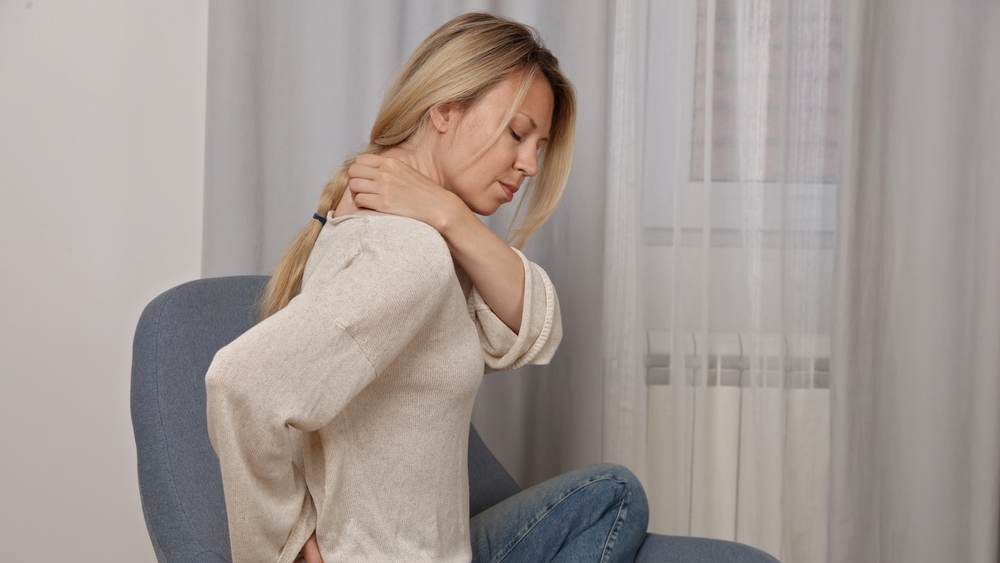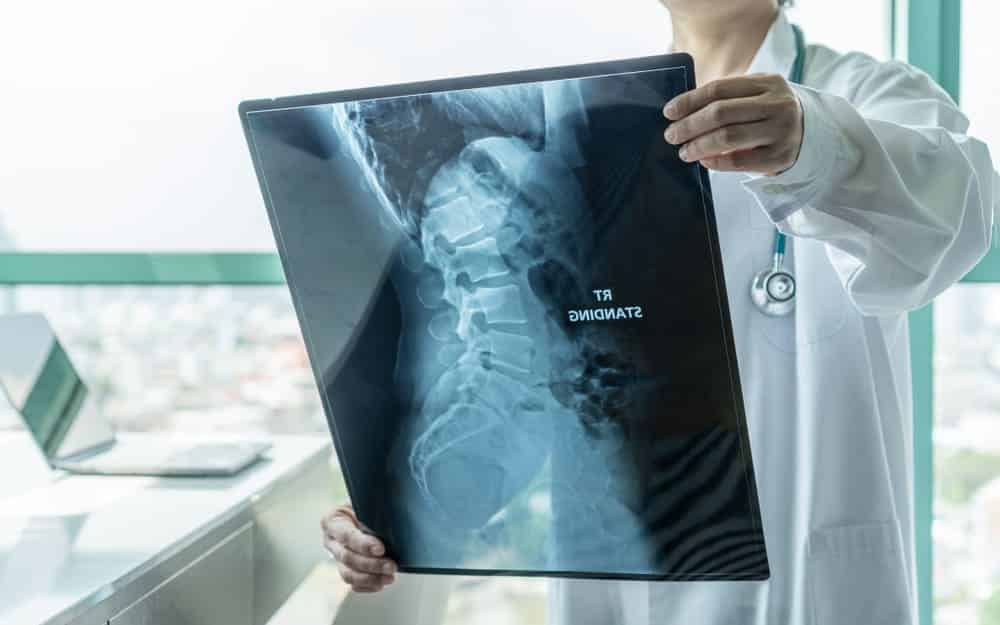Have you or someone you know ever been diagnosed with a disc herniation? Also commonly referred to as a slipped disc or a herniated disc, this type of spinal condition can cause pain in your spine as well as uncomfortable symptoms in other parts of the body. A herniated disc refers to an issue with one of the spinal discs that separate vertebrae that make up your spinal column. The spinal column is made up of a series of vertebrae stacked one on top of the other and separated by spinal discs. Spinal discs provide cushioning that acts as a natural shock absorber for your spine. When one of these discs slips or bulges out of place, you may need disc herniation treatment. There are many different options available for healing a herniated disc naturally instead of opting for surgical intervention. Here’s what you need to know about natural treatment for a herniated disc and how you can experience lasting relief from this spinal condition.
What Is a Disc Herniation?
Spinal discs are comprised of a tough outer shell that protects a gel-like inside known as a nucleus. A disc herniation refers to when that tough outer shell is cracked or torn, allowing the inner contents of the disc to bulge outward. When this occurs, the disc is often referred to as slipped, herniated, or prolapsed. The spinal column relies on a proper alignment of vertebrae and spinal discs to help support your back and neck. The spinal column also houses the central nervous system, which is a bundle of nerves that runs from your brain stem through your spine and sends signals out to the rest of your body. If a herniated disc occurs, then the gelatinous insides of a spinal disc can slip out of its normal positioning and aggravate or compress nearby nerves. This can cause you to experience common symptoms of a herniated disc.
Symptoms of a Herniated Disc
The most common symptoms of a herniated disc include pain, tingling, weakness, and numbness. A herniated disc can cause pain in the area where the slipped disc is located, as well as pain in other areas of the body. If a nerve is compressed or pinched by the protrusion of the spinal disc, then it can send pain and other signals to other parts of the body. For example, a disc herniation that occurs in your neck may also cause pain signals to occur in your shoulder and extend through your arm and hand. Pain due to a herniated disc can also be made worse by certain movements, like while moving from sitting to standing.
A herniated disc can also cause tingling sensations when a nearby nerve root becomes aggravated by the slipped disc. These tingling sensations often occur in the extremities, extending through the arm and hand or the leg and foot. For example, a herniated disc in the lower back can cause tingling sensations to extend through the hips, buttocks, and into the leg and foot. Tingling, weakness, and numbness will typically occur on one side of the body. Weakness and numbness can also occur in your extremities when nerves are damaged by a herniated disc.
Common Causes of a Herniated Disc
There are several ways a spinal disc can become damaged and lead to a herniated disc. Here are five common causes of a herniated disc.
Wear & Tear
A lot of pressure is placed on the spine throughout a person’s lifetime, and general wear and tear on the body can slowly start to impact spinal discs. As you age, the outer shell of your spinal discs may become more brittle, making them more susceptible to cracks or tears. The gel-like inner part of the spinal disc can also start to dry out, also making the disc more likely to wear out over time.
Car Accident Injuries
Whiplash is the most common car accident injury and can lead to a herniated disc. Damage to the spine in your neck due to a car accident can end up damaging a spinal disc in your cervical spine. The force of impact when two vehicles collide can jostle and jolt your body around, putting too much pressure and strain on your spine, causing the outer shell of a spinal disc to. Disc herniation can either be a short or long-term effect of whiplash injury.
Sports Injuries
Sports injuries that affect the spine can also lead to a herniated disc. Contact sports like football, rugby, and wrestling can put you at greater risk for a slipped disc. Sports can be very physically demanding, which can also put a lot of strain and stress on your spine. If you participate in sports activities that regularly require you to twist and turn your back, you risk straining your lower back and increasing your risk for disc herniation.
Slip & Fall Injuries
Another way to develop a herniated disc is through an accidental injury like a slip and fall. Some slip and fall accident injuries can occur due to age-related reasons, which also means your spinal discs may have already experienced some degeneration. As you age, spinal discs can more easily slip out of place because they lose some of their elasticity and structure.
Improper Lifting
Using improper techniques to lift heavy objects also commonly causes a herniated disc. Many people who suffer a slipped disc do so after improperly lifting heavy objects or performing job tasks that require frequent lifting motions. Bending with your back instead of your knees to lift a heavy object can put undue stress on the spine, which can then cause a spinal disc to slip out of alignment.
Diagnosing a Herniated Disc
In order to diagnose a herniated disc, you will need to see a doctor for a physical exam. Your doctor will inspect your spine and look for the source of what is causing your pain and other symptoms. They will want to hear about when you first noticed your symptoms and if they were caused by an obvious injury to the area, like a sport or car accident injury. Your doctor will also want to know how long you have been experiencing the symptoms and if they get worse with certain movements or activities. Additionally, it is important to talk to your doctor if you notice pain, tingling, weakness, and numbness in other parts of your body. A thorough report of your symptoms and medical history can help your doctor determine if a diagnosis of disc herniation is most appropriate. They may also want to run diagnostic tests of the area, such as an X-ray or CT scan, to get a clear image of the affected area and also rule out other potential causes of your symptoms.
Natural Treatment Options for a Disc Herniation
There are a wide range of options for treating a disc herniation. Your doctor will likely recommend a more conservative approach to treating your herniated disc at first, including natural remedies for a herniated disc. Here are examples of natural treatment options for a disc herniation and how you can experience lasting relief without invasive procedures or surgical interventions.
At-Home Remedies
If you are experiencing mild symptoms with your disc herniation, then your doctor may recommend treatment you can engage in from home. This may include taking over-the-counter pain relievers to help manage your pain as you recover from a recent injury. If you suffered a disc herniation after a car accident or while playing sports, then your doctor may recommend you take a few days to rest and allow any swelling and inflammation to go down. Over-the-counter anti-inflammatory medications can also help reduce swelling, along with applying cold compresses to affected areas. While it is possible for a mild herniated disc to resolve on its own, there are many instances where support from a doctor, chiropractor, or physical therapist will also be necessary. These at-home remedies are often recommended in tandem with other treatment techniques to help you heal from a herniated disc as swiftly as possible.
Stretches & Exercises
Contrary to what you may expect, you will want to stay active with stretches and exercises that promote strength in your muscles. In order for your spine to function optimally, it requires support and stability from your back muscles. Stretches and exercises can help strengthen these back muscles so that your spine can stay in a healthy alignment. Your doctor may also recommend exercise for a herniated disc that helps reduce your pain and other symptoms of a herniated disc. Safe stretches and exercises will reduce pressure on the area of the spine where the herniated disc is located while also improving the strength and stability of supporting musculature. If you have a herniated disc in your neck, then gentle neck stretches – tilting your head forward and backward, then side to side – can help relieve pain and pressure on the vertebrae in your neck. Hamstring stretches can also help to reduce pain and pressure on your spine if you have a slipped disc in your lower back.
Chiropractic Care
Chiropractors offer all-natural treatment options for a wide variety of musculoskeletal injuries and conditions, including a herniated disc. In addition, chiropractors do not prescribe medications and instead promote the body’s natural healing abilities. A chiropractor can help you experience lasting pain relief with all-natural techniques like gentle chiropractic adjustments to the spine. These adjustments can help bring the vertebrae and their spinal discs back into proper alignment. Chiropractic adjustments help to restore your spine to its natural alignment, which will naturally alleviate pressure on an aggravated or slipped spinal disc. Your chiropractor may also use techniques like therapeutic massage to help promote healing and recovery to supportive muscles and tissues in the area.
Physical Therapy
Your doctor may also recommend physical therapy for natural disc herniation treatment. A physical therapist can help you manage your pain and other symptoms while walking you through therapeutic stretches and exercises to help support your spine. Physical therapy, also known as physiotherapy, can help with a wide variety of health conditions and helps you strengthen your muscles, improve your mobility, improve your posture, and increase your flexibility and endurance. Physiotherapy for disc herniation is a widely used treatment technique for a slipped disc and also helps you avoid more invasive surgical interventions. A physical therapist will design a personalized treatment program for you that will speed up your recovery and allow you to practice safe stretches and exercises at home so you can return to your regular lifestyle and activities as soon as possible.
Activities to Avoid with a Herniated Disc
When you are dealing with a herniated disc, there are some activities you will want to avoid. One of the most common activities to avoid is doing any heavy lifting while you are in treatment for a herniated disc. Your doctor may also recommend you avoid certain sleep positions that can put too much pressure on your spine and aggravate your symptoms. If you have a herniated disc in your neck, then it is best to avoid spending too much time hunched over a keyboard or phone, which can put additional pressure on the aggravated spinal disc. If your herniated disc is in your lower back, then avoid sitting for long periods of time, which might stress and strain the area.
Non-surgical Treatment Options vs. Surgery
Talk to your doctor about natural treatment options for disc herniation and how to avoid surgery. Most people respond well to more conservative treatment options and start to experience a lessening of symptoms in 4-6 weeks with nonoperative treatment of a herniated disc. If your symptoms of a herniated disc cannot be managed by non-surgical treatment options, then your doctor may want to discuss less minimally invasive treatment techniques to help manage your pain. This may include surgery to remove part or all of the herniated disc. In some cases, a herniated disc can start to impact your muscle function or cause pain and other symptoms that significantly impact your health and well-being. In these cases, surgery may be the recommended course of treatment.
If you are dealing with a herniated disc and are looking for how to heal a herniated disc naturally, then visit AICA Orthopedics. Our team of multi-specialty doctors will always discuss more minimally invasive treatment options with you before resorting to surgical intervention. Visit an AICA Orthopedics location near you to find out more about how we can help with treatment for disc herniation.
Sources
InformedHealth.org [Internet]. Cologne, Germany: Institute for Quality and Efficiency in Health Care (IQWiG); 2006-. Slipped disc: Non-surgical treatment options. [Updated 2020 Apr 9]. Available from: https://www.ncbi.nlm.nih.gov/books/NBK279469/
Saal, J. A., & Saal, J. S. (1989). Nonoperative treatment of herniated lumbar intervertebral disc with radiculopathy. An outcome study. Spine, 14(4), 431–437. https://doi.org/10.1097/00007632-198904000-00018,
Abou-Elroos, D. A., El-Toukhy, M., Nageeb, G. S., Dawood, E. A., & Abouhashem, S. (2017). Prolonged Physiotherapy versus Early Surgical Intervention in Patients with Lumbar Disk Herniation: Short-term Outcomes of Clinical Randomized Trial. Asian spine journal, 11(4), 531–537. https://doi.org/10.4184/asj.2017.11.4.531








